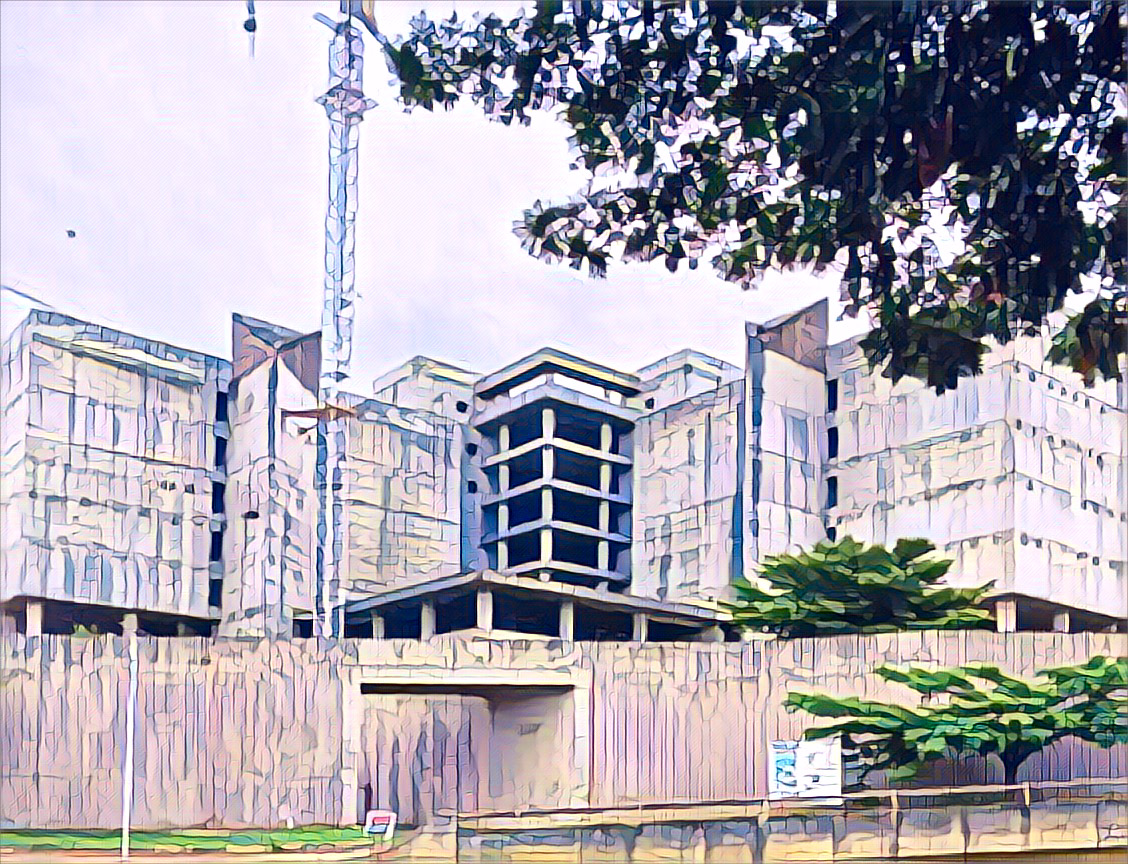Despite initial investments exceeding N20 billion, the National Library Headquarters building in Abuja has remained abandoned for the past 11 years. Originally valued at less than N9 billion in 2006, the project’s completion cost has now skyrocketed to at least N200 billion, according to recent findings.
The National Library project began under President Olusegun Obasanjo in 2006 and was halted in 2013 after about 50% of the work was completed. Sources attribute the delays to a lack of political will from successive administrations and obstruction from top civil servants.
The Muhammadu Buhari administration attempted to revive the project by allocating N80 billion, but the funds were not disbursed. The National Library Headquarters in Abuja is an 11-storey structure that includes two basement floors, a ground floor, and eight upper floors, designed to host a variety of facilities such as a bookstore, locker rooms, a bindery, printing press, exhibition hall, auditorium, restaurants, clinic, crèches, and changing rooms.
The building is also intended to house cataloguing sections, general reference areas, legal deposits, book stacks, reading areas, and an administration block. Additionally, it will feature an electronic data processing center, a library research and training center, public conveniences, perimeter fencing, gates, gatehouses, electrical and mechanical services, internal roads, and other external works.
Reynolds Construction Company (RCC), the contractor, disclosed that as of now, the building is only 44.6% completed. Initially, the project was supposed to be completed within 22 months at a cost of N8.59 billion. However, in 2010, the Ministry of Education revised the contract to N17 billion, extending the completion period to 21 months.
As the years have passed, the costs have continued to rise, primarily due to inflation. In 2021, the Ministry of Education projected the completion cost at N49.64 billion, while the construction firm estimated it at N120.33 billion. With the current exchange rate of N1,534/$1, it is estimated that the project may now require around N218.44 billion to complete, reflecting the surge in building material costs.
A source within the National Library, who preferred to remain anonymous, accused some top civil servants of deliberately stalling the project due to a lack of kickbacks. “You know our civil servants and how they operate. If there is no kickback for them, they will do everything to frustrate it. That is exactly what is stalling the project,” the source said.
It has been alleged that appropriations for the National Library project have often ended in mere discussions, with earmarked funds not being released. Following his inauguration last August, Education Minister Tahir Mamman, along with Minister of State for Education Dr. Yusuf Sununu, visited the project site and assured that the National Library would be completed in 21 months. However, many stakeholders remain skeptical, recalling similar unfulfilled promises by former Education Minister Adamu Adamu.
In 2021, in an attempt to bypass bureaucratic bottlenecks, President Buhari approved the takeover of the project financing by the Tertiary Education Trust Fund (TETFund). Despite this intervention, the first tranche of N15 billion set aside by TETFund has yet to be released. TETFund’s Executive Secretary, Sonny Echono, attributed the delay to “due process.”
“There is a due process involved in any release from our organisation, and we still require two documents before we can release the money. The funds are available; they are with us, but we are unable to release them until we get evidence of the Federal Executive Council’s (FEC) approval for the revised estimated total cost. The second document we require is an undertaking by the contractors that they will complete the project at the approved cost,” Echono explained.
With the contractor failing to return to the site, concerns are growing that the 21-month completion timeline will not be met. The Chief Executive Officer of the National Library of Nigeria (NLN), Prof. Chinwe Anunobi, cited a lack of funds as the primary delay and labeled the situation a global embarrassment for Nigeria. She emphasized the importance of the project, noting that national libraries play a crucial role in promoting education, culture, and history.
“The greatest challenge I have is that when we meet at our World Conference of Directors of National Libraries, it is always a spotlight. NLN is yet to be completed. Every member of the participating directors would be asking what is holding the project. Nigeria is not standing tall as far as national monuments are concerned; you also need to know that the national library represents the value a country places on education,” Anunobi said.
Dr. Ikechi Nwogu, co-founder of DFA Cinfores Limited, underscored the significance of national libraries as repositories for a country’s cultural heritage and historical records. He lamented that successive administrations lacked the political will to complete the project despite its immense benefits.
Adaramoye Michael Lenin, National Mobilisation Officer of the Education Rights Campaign (ERC), expressed frustration over the prolonged neglect of the National Library. He highlighted the critical role a completed and well-equipped national library would play in providing an effective study environment for students, especially in the context of under-equipped public schools.
“It is baffling that a project of such significance has been left to rot for so long,” Lenin lamented. He advocated for prioritizing the provision of libraries and facilities in schools to aid effective learning.
The stalled National Library project reflects the broader challenges facing Nigeria’s education sector, including bureaucratic inefficiencies, lack of political will, and corruption. To revive the project and restore its significance, the government must prioritize education and ensure transparent, efficient management of public resources. Only then can Nigeria hope to complete the National Library and enhance its educational infrastructure, benefiting future generations.
Source: The Guardian


